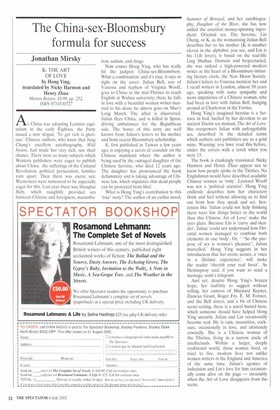The China-sex-Bloomsbury formula for success
Jonathan Mirsky
K: THE ART OF LOVE by Hong Ying, translated by Nicky Harmon and Henry Zhao Marion Boyars, £9.99, pp. 252, ISBN 0714530727 As China was adopting Leninist capitalism in the early Eighties, the Party issued a new slogan, 'To get rich is glorious.' Chinese authors, who knew that Jung Chang's excellent autobiography, Wild Swans, had made her very rich, saw their chance. There were so many subjects which Western publishers were eager to publish about China: the sufferings of the Cultural Revolution, political persecution, families torn apart. Then there was exotic sex; Westerners were rumoured to be especially eager for this. Last year there was Shanghai Baby, which naughtily provided sex between Chinese and foreigners, masturba
tion, sadism, and drugs.
Now comes Hong Ying, who has really hit the jackpot: China-sex-Bloomsbury. What a combination: and it's true, it says so right on the cover. Julian Bell, son of Vanessa and nephew of Virginia Woolf, goes to China in the mid-Thirties to teach English at Wuhan university; there he falls in love with a beautiful woman writer married to his dean; he almost goes on Mao's Long March. The affair is discovered. Julian flees China, and is killed in Spain, driving ambulances for the Republican side. The bones of this story are well known from Julian's letters to his mother and from recent Bloomsbury scholarship.
K, first published in Taiwan a few years ago, is enjoying a succes de scandale on the Chinese mainland where the author is being sued by the outraged daughter of the Chinese heroine, who died 12 years ago. The daughter has pronounced the book defamatory and is taking advantage of Chinese law, which stipulates that dead people can be protected from libel.
What is Hong Ying's contribution to this 'true' story? The author of an earlier novel, Summer of Betrayal, and her autobiography, Daughter of the River, she has now added the essential money-spinning ingredient: Oriental sex. The heroine, Lin Cheng, or K, as the womanising Julian Bell describes her to his mother (K is number eleven in the alphabet, you see, and Lin is his 11th lover), is based on the real-life Ling Shuhua. Demure and bespectacled, she was indeed a high-powered modern writer at the heart of a Bloomsbury-imitating literary circle, the New Moon Society, Julian's letters to Vanessa mention her and 1 recall writers in London, almost 50 years ago, speaking with some sympathy and more impatience of a Chinese woman, who had been in love with Julian Bell, hanging around at Charleston in the Forties.
Hong Ying's imagined heroine is a furnace in bed, fuelled by her devotion to an ancient Daoist sex manual, The Art of Love. She overpowers Julian with unforgettable sex, described in the detailed terms which authors and publishers see as a gold mine. Warning: you have read this before, under the covers with a torch when you were 13.
The book is clunkingly translated. Nicky Harmon and Henry Zhao appear not to know how people spoke in the Thirties. No Englishman would have described available Chinese women as 'tatty'. Leonard Woolf was not a 'political scientist'. Hong Ying endlessly describes how her characters think and feel without allowing us to find out from how they speak and act. Sentences like 'Julian could not help thinking there were few things better in the world than this Chinese Art of Love' make the eyes glaze. Because Lin is 'curvy and slender', Julian 'could not understand how Oriental women managed to combine both elements in one body'. Or, "So the purpose of sex is women's pleasure", Julian marvelled.' Hong Ying suggests in her introduction that her erotic scenes, a 'once in a lifetime experience', will make the reader 'cherish your real lover'. As Hemingway said, if you want to send a message, send a telegram.
And yet, despite Hong Ying's brazen hope, her inability to suggest without telling, her cameos of Maynard Keynes, Duncan Grant, Roger Fry, E. M. Forster, and the Bell sisters, and a bit of Chinese scene-setting, there is a novel buried here, which someone should have helped Hong Ying unearth. Julian and Lin occasionally become real. He is vain, insensitive, cocksure, occasionally in love, and ultimately cowardly. She is a Chinese woman of the Thirties, living in a narrow circle of intellectuals. Within a larger, deeply traditional world, those women lived, or tried to live, modern lives not unlike women writers in the England and America of the same time. Julian's agonies of indecision and Lin's love for him occasionally come alive on the page — invariably when the Art of Love disappears from the scene.


























































 Previous page
Previous page